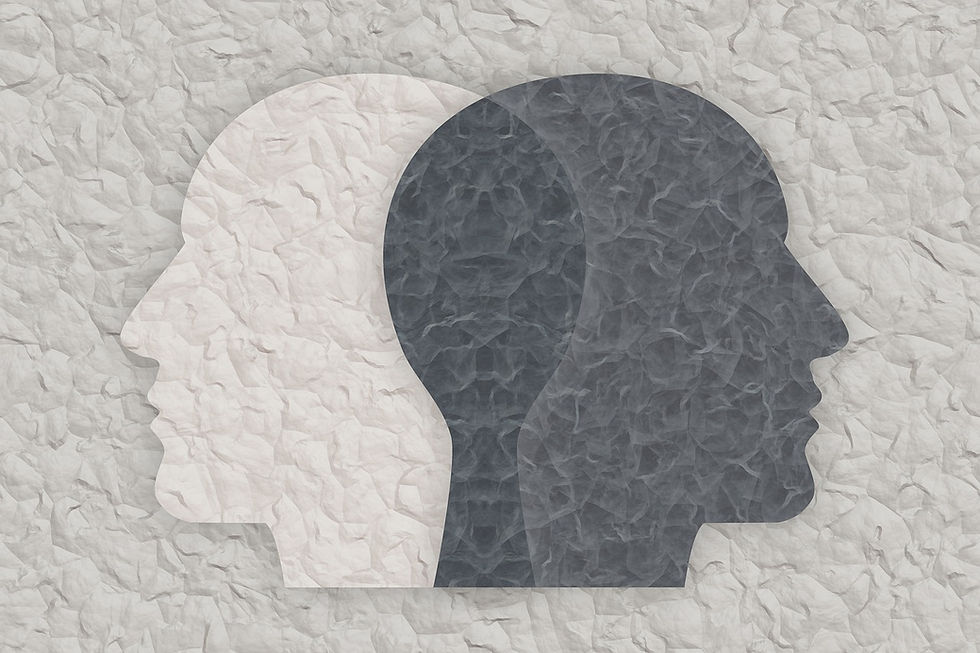Chapter 1: Me and My Timeline | Kelly's Story
- Feb 6, 2022
- 11 min read

此采访为中文采访,中英文参访字幕在文末。
In March 2021, CandleX director Xiaojie interviewed Kelly Yang on her experience with bipolar disorder. A year later, CandleX decided to present this interview in five chapters to commemorate World Bipolar Day. This is Chapter 1 of the interview.
In Chapter 1, Kelly first introduces herself to the audience. She grew up in Beijing with her parents, studied abroad for college, and is on her dream career path. She illustrates herself as a hard worker and high achiever. Through her stories and descriptions, we get the sense that Kelly’s life was quite ideal and successful. She says that on the outside, she is an extrovert who loves to socialize and try new things. However, she explains that because of her constant desire for excellence, deep down there is another side to her that is very vulnerable, sensitive, and prone to self-doubt.

Xiaojie then asks Kelly when she first experienced symptoms of bipolar disorder. According to Kelly, there were three times she had signs of bipolar disorder. The first time was in Kelly’s last year of college: she was stressed with life decisions and pressured to do well on important exams for graduate school. She was constantly self-doubting and surrounded by negativity during this time until she finally received the offer to graduate school and could feel relief.
The second time was a bit like the first: she pressured herself to do the absolute best in graduate school, which caused her to use excessive energy in studying and be in a constant state of self-doubt for half a year. This time, the symptoms went away when she won the major scholarship award and was first in her grade.
The third and most previous time was due to work: she was under high work pressure, so when she made a small mistake, she thought her life was ruined. She says this third time was different from previous times because her emotions were going from one extreme to the other. She remembers her father telling her that for five days, she was restless and didn’t sleep. On one extreme, she would jump, run, shout, and cry at home or act crazy out in public. On the other extreme, she would hide in the corner of her room without talking or eating.
Xiaojie summarizes with Kelly’s confirmation that the first two episodes (times) Kelly described were closer to depression, and the third episode was when she started having bipolar symptoms. In Chapter 2, they will discuss more about the emotional states during phases of bipolar disorder.

TRANSCRIPT
Xiaojie: It's good to see you again today. This is the second time we've met, right?
Xiaojie: The first time we met should be last week (March 2021).
Kelly: We met at one of the movie nights.
Xiaojie: So I'm very happy that we had that conversation after the movie, and you said that you were willing to share your experience with bipolar disorder and the treatment process you went through. So I'm delighted to speak with you in our "broadcast studio" today.
Kelly: Yes, because I had my own experience with bipolar disorder for about two years, and as I told you last time, after people around me knew that I have this illness, they came to me for consultation, or hoped I could share some advice with them, so I hope that I can help more people who suffer from this mental illness, so that they can know how to get proper treatment, or how to get out of this predicament.
Xiaojie: Yes, actually experiencing a bipolar disorder is a journey. I would like hear your story bit by bit from the very beginning.
Kelly: I graduated from Hong Kong Baptist University, and I am now working on documentary production as a documentary director. My life story is relatively simple since I am a Beijinger, I grew up with my parents, had about a year and a half of overseas study experience, and after I returned, I successfully got to work my dream job at a TV station. Actually, everything went relatively smooth for me. I am seen as the "good child" in others' eyes. So before my illness, everyone would think I was doing well in all aspects and that my parents never need to worry about me. I always had an excellent image. Even when I was suffering from bipolar disorder, everyone was shocked because they thought life was so smooth for me. I think this is a misconception that others have.
Xiaojie: Right, and it's quite a common misconception, too. May I ask you about your personality? You talked about how your entire life has been quite smooth and successful, so what are you like in the eyes of people around you?
Kelly: I don't know if I feel too good about myself, but I have always thought of myself as quite extroverted. Of course, I'm not THAT open. I'm just more willing to share my thoughts with people, and I like to socialize and hang out with people. I have many hobbies and interests, and I hope to explore more possibilities. I am actually a more outgoing person who is willing to try new things, and my personality was always like this. Of course, with this outgoing personality, there is definitely another side. That is, there is also a very sensitive and delicate side. It may be due to my desire for excellence ever since I was young, so I would constantly judge myself, like what if I am not good enough, or did I say something to make others unhappy? Behind the outgoing side there is, this introverted, sensitive and vulnerable side. I think it's this kind of double-sided personality.
Kelly: There are actually three times when I showed signs of this illness. The first time was when I was preparing for my postgraduate exam, I was taking the IELTS test, and that time I was faced with a life decision. My parents, including my boyfriend at that time, couldn't give me much advice that I could rely on, so I had to make this choice on my own. When making a choice, I was always torn, not knowing what to do, and I also wished to get a very high score on the IELTS exam, so during the entire time of the exams, I could clearly feel that my emotions were very low, and stayed low for a really long time.
Xiaojie: You mentioned for a long time, so about how long?
Kelly: Around six to eight months. During this period of time, I was always in a state of self doubt. I felt like I was not good enough. I would think "why couldn't I do anything well?" There were always these negative emotions surrounding me. This time, once I received the offer to my school, everything was fine again. In fact, after the offer, it all felt fine at once. So this was the first time. The second time was when I was studying at HKBU. because my undergraduate degree was in international finance, and I took a big leap to an international news major for my graduate major. Because learning journalism and working in television has always been my dream, so I really hoped that through this experience of studying abroad, I could really understand how to work in the industry I want. So, at that time, I worked very hard. I was afraid that I wouldn't do well. Every night I called my mother crying, telling her why I couldn’t do anything well and why I was so incompetent. But in fact, this inability to do well was the self-image that I put on myself.
Xiaojie: That’s stress.
Kelly: No matter how many people told me otherwise, it didn't work. I firmly believed that I wasn't good enough, and I told myself that I needed to work even harder. It might sound a bit like I'm bragging, but this time, I won the only major scholarship award in my whole grade,
Xiaojie: That is already fantastic.
Kelly: I was first place in my entire grade that year, and I felt like I received affirmation, so my emotions stabilized again. This second time also lasted for about half a year. It was also a time of extremely negative emotions and no lifted spirits when I wouldn't eat or sleep. This was the second time. The third time, and the most recent one, was because of work. I was under a relatively high-intensity work pressure, so because of a minor mistake, I suddenly broke down. That mistake was minor to the point where it's like I can't even recall it now, but it had felt like the whole world collapsed around me. I thought all the decisions I made and everything I had done were all wrong. I thought my relationships were ruined. I thought my career was gone, and love was gone. At the time, I fed myself a lot of these imaginations. That time, it was obvious that my reactions were different from previous times. My emotions swayed between two extremes. I remember my father telling me that I went five days without sleeping, and I didn't feel tired at all. I would jump, run, shout and cry at home, and when I was outside, I would go mad and act sort of crazy. Or I would sit in the corner of my room all day without speaking, responding, or eating. I was jumping between these two extremes.
Xiaojie: So for the first two times, it sounds like you had many months of depression. But you were in a stably depressed state during those times.
Kelly: Correct.
Xiaojie: The third episode was actually when you started to have bipolar symptoms, right? Can you tell us, during times when you feel bipolar symptoms, what the high and low emotional states are like? For depression, the emotional state is depressed; some people are sorrowful, others are numb with low spirits. I want to learn more about the emotional and physical experience during times of mania for you.
文字稿
记者:很高兴今天再一次见到你,这应该是我第二次见到你了是吧?
诗诗:对,是。
记者:咱们第一次应该是在上周?
诗诗:对。
记者:上周的时候。
诗诗:在那个观影会上见到的。
记者:所以我很开心当时我们在观影会结束之后说,你有一些自己的经历,包括你治疗的一些过程,愿意跟我们分享,所以我非常高兴今天能够在我们的直播间里头跟你有一次的谈话。
诗诗:是,因为我确实是自己有过,现在有两年左右的双向情感障碍得病的经历,包括像上次跟你讲的,就是我身边的很多人知道了我有这个病之后,都愿意去来找我咨询,或者是希望我能跟他们分享一些我的建议,所以我还是很希望能够帮助更多的人,就是有这个困扰的人,能够希望让他们知道怎么才可以得到一个正确的治疗,或者是怎么才可以帮助这些人走出这个困境。
记者:对的,其实有双向情感障碍,是一个旅程,我就从最开始一点一点来听你讲故事。
诗诗:大家好,我叫诗诗,也可以叫我Kelly,我是毕业于香港金汇大学,现在从事的是一个纪录片的拍摄工作,是一个纪录片导演,其实我的经历还比较简单,因为我是北京人,就是从小在父母的身边长大,有过大概一年半左右海外留学的经历,回来之后就很顺利的进入到了电视台进行,从事自己比较梦想的一个职业,其实一路下来算是比较顺利的,算是一个别人眼中的好孩子的那种形象,所以其实一直在得病之前,大家都会觉得诗诗怎么样,哪里都好,不用父母操心,其实一直都是以这样一个形象在世人面前出现的,直到后来得病其实大家也都会觉得你怎么会得病,你明明都那么的顺利,其实算是大家的一个误区吧。
记者:对,这也是挺常见的一个误区吧,我能大概问一下你的性格,你刚才有谈到说你可能生活上一路走的也比较顺利,在一般人平时跟你接触的这些朋友里头,大家眼中的你会是什么样子的?
诗诗:我个人觉得也不知道是不是太自我感觉良好了,因为我一直以来,我认为我是一个算是比较外向的性格,当然了也没有说那么的Open,就是一个比较愿意跟人去分享自己的想法,然后比较喜欢社交,比较喜欢跟人出去玩儿,自己有比较多的兴趣爱好,比较希望能够探索更多的可能性,其实是一个比较外放的人,愿意去接触很多新鲜的事物这样的一个人,我之前的性格一直就是这样的。
诗诗:当然除了这个外放的性格,肯定在另外一面,就是会有很敏感细腻的一面,就是因为可能也是我自己本身从小就是希望自己能够优秀这样的一个底色在,其实自己会不断的审视自己,会不会是在哪方面做的不够好,会不会是我说了这句话他有没有不高兴,其实是会有在外向的背后是有自己内向的和敏感脆弱的一面,我觉得是这种双面的性格。
记者:对啊。
诗诗:我其实算是有三次这个得病的一个征兆,第一次大概是在我大四要考研,出去考学然后考雅思的时候,因为那个时候面临着一个算是人生的抉择吧,而且在这方面其实我父母啊,包括我那个时候的男朋友也不能给我太多,很让我觉得有依靠的建议,所以我只能自己去做这个选择,然后在做选择的时候就一直很纠结,不知道应该怎么办,包括当时考雅思又希望考到一个很高的分数,所以其实是在当时考学的时候,就整个一段时间,能很明显的感觉到这个情绪非常的低落,就是持续很长一段时间都很低落。
记者:很长一段时间,大概有多长时间?
诗诗:有个半年到八个月吧,这段时间其实一直都是处于非常,就觉得自己不行,我怎么这么不行,什么都做不好,总是有一些负面情绪围绕着你,这一次其实相当于在我拿到进会的offer之后,一切就好了,这个情绪一下子就没有了,其实是在这个节点之后,一下子就好了,这是第一次。第二次是我在进会读书的时候,因为我其实本科学的是国际金融,我是研究生的时候跨了一个很远的专业学的国际新闻,因为学新闻做电视一直是我的一个理想,所以说我很希望能够通过这次海外求学的经历,让我能够真正懂得怎么去做我想做的这个行业,那个时候就非常的用功,我很怕自己学不好,我就恨不得废寝忘食的那样去学,每天晚上的时候都打电话回去给我妈哭,说我为什么什么都做不好,为什么这么不行,但其实这种所谓的不好、不行,是自己给自己施加的那种印象。
记者:压力。
诗诗:其实别人,不论多少人说你已经做的很好了,你做的很棒了,你非常好,但是都不行,自己就是觉得自己不行,一定要再去更努力,然后这一次呢,其实这样说可能现在所谓说的有点“凡尔赛”,这一次是我知道拿了当时全年级唯一一个第一名的一等奖学金。
记者:已经很棒了。
诗诗:我当年是拿到我们全年级的第一,那之后就突然好像得到了一个肯定,一下子那个情绪也没有了。第二次大概是去了有也是差不多半年左右的时间,但也是属于情绪非常低落,一直都提不起兴致来,也不吃饭,不睡觉,大概是这样,这是第二次。第三次就是工作,也就是最近的这一次,其实是相当于我一直处于一个比较高强度的工作压力当中,是因为一个非常小的失误,我突然一下子就崩溃了,那个原因小到已经现在感觉提都已经提不出来了,那种感觉,但是突然一下子就感觉世界崩塌了,觉得我以前做的所有决定啊,包括所有的这些事情都错了,我这个人际关系也崩塌了,我工作也没了,爱情也没有了,当时就给自己加了很多这种臆想,那一次的反映就很明显跟前两次有所不同,它是会情绪在两极当中来回的游弋,我隔很长一段时间,就是我父亲跟我讲的差不多五天五夜不睡觉,而且那五天五夜不睡觉就是完全不觉得累,一直在屋子里蹦、跑、嘶吼、哭,在外面也是就是各种的发疯,做一些,有一些看起来有点发疯的行为,要么就是在屋子里面坐在角落里一天都不说话,怎么叫都不应声也不吃饭,大概是会在这两极当中来回的跳。
记者:所以第三次,前两次听起来有一个比较长的几个月的抑郁期,但是在这个抑郁期里头是一个平稳的状态。
诗诗:对。
记者:第三次的时候,其实就是在整个(英文),一个(英文)的时候,你就已经有这个双向的倾向了对不对,能够大概给我们讲一下双向的时候,高的时候和低的时候你的一个情绪状态是什么样的吗?因为抑郁的话它的这种情绪就是抑郁感,有的人有悲伤,有的人会有麻木的这种感觉,提不起兴趣之类的,你刚刚讲的我想更多的去探讨一下,我们在躁狂期这个时候是什么样的一个情绪体验以及你的生理体验?


Comments